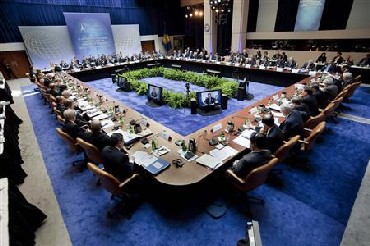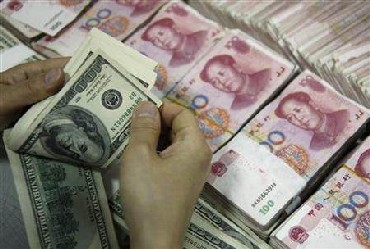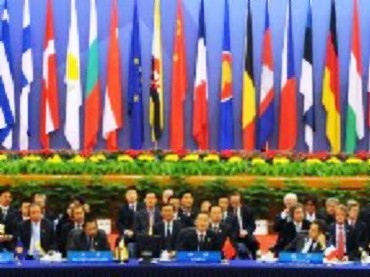Martin Feldstein
The recent meeting in Washington has contributed little to our understanding of the current 'global imbalances'.
The world's 20 most important finance ministers and 20 most important central bankers travelled to Washington in April from every part of the globe to accomplish, predictably, exactly nothing.
The subject of the G20's recent meeting was "global imbalances". According to the communiqu issued by the group, the meeting focused on developing a procedure for identifying which G20 countries have "persistently large imbalances" and why they have them.
This delicate analytical task was assigned to the International Monetary Fund (IMF), which is to complete its work before the ministers' next meeting in October.
...
What was the real outcome of the G20 meet?
Photographs: Petar Kujundzic/Reuters
It hardly takes a team of IMF economists to answer these questions. Anyone who has taken a first-year undergraduate course in economics would have no difficulty in identifying the countries with the largest trade surpluses and deficits.
The United States wins first prize with a trade deficit of more than $650 billion in the most recent 12 months. No other country comes close enough to be awarded second prize.
The broader current account indicator (which includes trade in services and net investment income) confirms America's leading role: its external deficit is nearly $500 billion.
No other country has more than a $100 billion current account deficit.
Even if we look at current account deficits relative to countries' GDP, America's 3.3 per cent ratio exceeds that of almost every other economy.
...
What was the real outcome of the G20 meet?
Photographs: Reuters
The three countries with larger deficit-to-GDP ratios have a combined deficit of less than $70 billion - not enough to warrant the G20's attention.
The country with the largest current account surplus is, no surprise, China, with a positive balance of more than $300 billion. Japan and Germany are the only other countries whose current account surpluses exceed $100 billion.
China's current account surplus is 4 per cent of its GDP. Several oil producers have larger relative current account surpluses that, combined, exceed China's in absolute terms.
And there are several other European and Asian countries with higher relative current account surpluses that together exceed that of China.
...
What was the real outcome of the G20 meet?
But the G20's decision to focus only on the member countries that account for more than 5 per cent of its combined GDP will exclude these smaller countries from the spotlight. Only China and the US, and perhaps Germany and Japan, will occupy centre stage.
So much for the not-so-difficult task of identifying the countries with big imbalances. But what about the causes of those imbalances?
Every student of economics knows that a country's current account deficit is the difference between its national investment (in business equipment, structures and inventories) and its national saving (by households, businesses and government).
That is not a theory or an empirical regularity. It is an implication of the national income-accounting definitions.
The US has an enormous current-account deficit because the federal government's dis-saving (that is, the fiscal deficit) drags down America's overall national saving.
...
What was the real outcome of the G20 meet?
And the reverse is true for the Chinese, German and Japanese current account surpluses. In each of those countries, the level of national saving exceeds domestic investment, leaving output to be exported and funds to be loaned abroad.
So the policy actions needed to reduce the trade and current account imbalances are clear enough.
The US must raise its national saving rate by shrinking its budget deficit, which currently stands at nearly 10 per cent of GDP.
Fortunately, the desirability of doing so is now clear to every policy maker in Washington and to most of the American public.
...
What was the real outcome of the G20 meet?
Photographs: Jo Yong hak/Reuters
It will begin to happen as the massive "fiscal stimulus" enacted in 2009 comes to an end, the political process begins to deliver spending cuts, and economic growth yields more tax revenue.
When President Barack Obama attends the G20's summit of heads of state in Cannes in November, he will no doubt agree to further reductions in the US budget deficit.
But that will be an empty promise: the US president has far less control over legislation than government heads in parliamentary democracies like Britain or in countries like China.
And Obama's power is even more limited now that his Democratic Party controls only one house of the US Congress.
The history of previous summits suggests that the president will promise in Cannes only what he has already proposed at home.
...
What was the real outcome of the G20 meet?
Photographs: Jo Yong-Hak /Reuters
The G20 ministers and central bankers are, of course, in no position to change the behaviour of either the US or China, whose recently adopted five-year plan makes clear that it will reduce national saving by increasing consumer spending and raising government outlays for services like health care.
In other words, China will, for its own domestic reasons, reduce its current account surplus.
The same kind of national self-interest that is driving the Chinese to stimulate domestic spending was at work when the G20 leaders met in London in April 2009 and agreed to take steps to stimulate their economies.
That agreement was easy to achieve, since it was in each country's interest to expand demand. The G20 only ratified what was going to happen anyway.
...
What was the real outcome of the G20 meet?
Photographs: Lee Jae-won/Reuters
But the G20 leaders and finance ministers nonetheless now point with pride to what they "accomplished" in London.
The same is likely to happen over the next few years as the US reduces its fiscal deficit and thereby shrinks its current account deficit while China reduces its national saving and thereby shrinks its current account surplus.
The leaders of the G20 will no doubt claim credit for this achievement. Perhaps that is why they like to meet.
The author is Professor of Economics at Harvard. He was Chairman of President Ronald Reagan's Council of Economic Advisers and is former President of the National Bureau for Economic Research.
Copyright: Project Syndicate, 2011.<P>...</P>










article